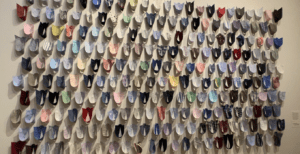Breen’s most recent installation at the Minneapolis Institute of Art, “The Labor We Wear,” is an ode to a pair of notable disasters that happened within the garment industry a century apart: The Triangle Shirtwaist fire of 1911, and the Rana Plaza factory collapse in Bangladesh in 2013.
“When the Rana Plaza collapse happened, I thought about sitting at my sewing machine and imagined the floor falling out,” she said. “And I immediately connected it to the Triangle Shirtwaist Factory fire. I knew a lot about that but I didn’t about Bangladesh.”
With a Rimon grant, Breen went to Bangladesh in 2014 with local writer Alison Morse to see the site first hand. They talked

“Collared” is made from the collars of shirts. Garment workers in countries like Bangladesh focus on individual parts of clothing, like collars and sleeves.
to survivors, organizers, and activists. It also led to the centerpiece of the exhibit: Shroud.
“We went to a public cemetery where more than 100 bodies were buried and identified only by DNA,” Breen said. “They weren’t identified because families couldn’t afford to come to identify the body, or a family that worked there had been wiped out. It was haunting.”
Breen learned a commonality between Jews and Muslims is how they bury their dead in a simple, white shroud. For the art installation, Breen hung 1,281 white shirts from the ceiling to commemorate the lives lost in the Triangle Shirtwaist and Rana Plaza disasters. Her statement said that she intentionally purchased the shirts used at Goodwill because “Thrift stores like Goodwill send unsold clothes either to landfills or third-party companies, which typically distribute them to the Global South. Massive shipments of unsold clothes serve to displace and erode local manufacturing industries in those countries.”
“It becomes symbolic of so much,” Breen said. “It’s absolutely part of the whole configuration of the system and what people were making when they died. It’s haunting. It’s supposed to be.”
Breen said that her work in this space has made her think about the organizers that came before her.

“Piece Work” is made from the sleeves of shirts. Garment workers in countries like Bangladesh focus on individual parts of clothing, like collars and sleeves.
“The International Ladies Garment Worker Union protesting and marching before and after Triangle led to significant safety laws in this country,” she said. “It’s not just about how you shop, but support union organizing in the country. That’s what Jewish union organizers and supporters were fighting for: Women want jobs, to be safe, and paid fairly.”
Breen said it’s a bigger issue than just deciding where shop.
“It’s not one thing, but the energy production of making the fabric, dying of fabric, transportation, all contributes to how clothes are made,” she said. “It’s not enough to shop differently; you have to think bigger about the changes we need to make. That perspective comes from my organizing and I bring that to my artwork. I see them as very connected.”
Breen’s next exhibition opens at the Soo Visual Arts Center (2909 Bryant Ave. S., Minneapolis). The Shapes We Take is another take on her visit to Bangladesh. She brought home a bag of fabric scraps from Bangladesh that she found outside of factories.
“They had piles the size of two-story houses,” she said. “They are just ordinary pieces of plaids and solids. It could be from a summer dress or cotton shirt. These are the leftovers; the negative spaces of our clothes. People don’t see the supply chain and don’t think about workers or anything before the store because it’s so invisible. They don’t think about how fabric is cut, dyed, sewed. They don’t give it a moment’s thought.”
The Shapes We Take has Breen sewing the fabric brought home from Bangladesh and sewed to paper to make abstracted maps.
“Works on paper are so very different,” she said. “My practice is very diverse, but a commonality is the stitch. The sewing machine about Tikkun Olam and repair. It’s how I embed the idea of the possibility of repair into my work.”
Breen will be featured along with vocalist/composer Ariella Forstein, and filmmaker Barbara Wiener at the Rimon Artist Salon Series opens its fourteenth season with Women Repair the World: Artists Edition, a virtual Zoom event on November 11, 7 p.m.
“I’m excited that our work is all so different,” Breen said. “To approach the idea of social change and Tikkun Olam from different lenses and passions, it’s a nice event to show the range of artistic approaches. In art, there’s so many ways to respond to this idea of social change and Tikkun Olam. The medium and work is different, but we’ve all found ways to respond and bring voice to how we repair the world.”
Participation in the Rimon Artist Salon is free but registration is required at http://bit.ly/WRWArtist. For more information contact the Rimon office at 952-381-3449 or at [email protected].

